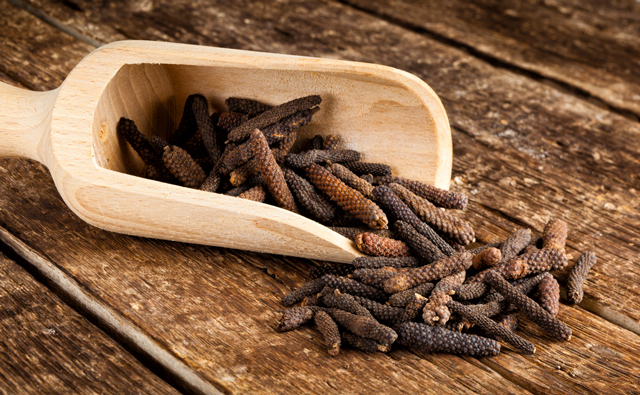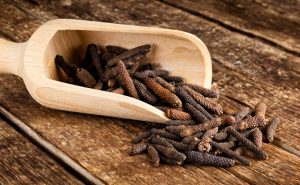
Long Pepper – sources, health benefits, nutrients, uses and constituents at NaturalPedia.com
Wednesday, June 21, 2017 by Earl Garcia
http://www.naturalpedia.com/long-pepper-sources-health-benefits-nutrients-uses-and-constituents-at-naturalpedia-com.html

Long peppers, also called Indian long pepper or pippali, are valued for their immense benefits. The plant is a flowering vine characterized by its soft stem and thin, hairy branches. The berries and the roots are great commodities in Indian medicine. Long peppers are primarily cultivated in warm and temperate areas of India.
List of known nutrients
Long peppers are among the most nutritious spices used today. NutritionData.Self.com has listed the many nutrients found in long peppers.
- Betaine
- Calcium
- Choline8
- Folate
- Iron
- Magnesium
- Manganese
- Niacin
- Pantothenic acid
- Phosphorus
- Potassium
- Riboflavin
- Selenium
- Sodium
- Thiamin
- Vitamin A
- Vitamin B12
- Vitamin B6
- Vitamin C
- Vitamin D
- Vitamin E
- Vitamin K
- Zinc
Medicinal uses for long pepper
Long peppers are notably useful in maintaining liver health. The spice is known to contain healing properties that treat an overworked liver and prevent jaundice. Long peppers are also found to effectively eliminate toxins that accumulate in the liver due to consuming oily foods. Long peppers are known to cure indigestion too. According to experts, the spice is packed with stomach-soothing chemicals that address digestive issues. In addition, long peppers can be used to treat diarrhea.
The spice is also touted for their anti-diabetic effects. Long peppers are renowned for their ability to regulate glucose release in the blood. Aside from this, the spice can be used to increase insulin production in patients with diabetes. Like any other pepper, long peppers are capable of burning fatty acids too. Consuming long peppers may activate stagnant fat and eradicate toxins released by fat pockets. The spice has very few side effects that make it a powerful weight loss ingredient.
In addition, long peppers are touted for their antibacterial properties. Consuming long peppers may combat infections that trigger upset stomach or vomiting. The spice may even fend off bacterial infections that cause sinusitis and a clogged nose. Long peppers may also relieve cough and sore throat. Additionally, long peppers contain antiseptic and antibiotic properties that help ease fever.
Furthermore, long peppers are a popular tooth ache remedy. Experts recommend making a paste by using long peppers, salt and water to relieve tooth ache. Smearing the paste onto the affected gum area and leaving it for an hour provides instant relief from tooth ache. Regular long pepper consumption is also associated with reduced frequency and intensity of asthma attacks. Likewise, long peppers are known to prevent the onset of hair loss.
Long peppers are found to improve the body’s oxygen flow, bone strength, and skin condition. The spice prevents the onset of other diseases including lung conditions, strokes, headache, and menstrual problems. However, experts cautioned that pregnant and lactating mothers should not overuse the spice.
Body systems supported by long pepper
Long peppers benefit the the liver and digestive system in general. The spice’s antibacterial properties boost the body’s immune system. Likewise, long peppers are essential in maintaining a healthy respiratory system. In addition, the spice benefits the bones, the skin, the heart and the female reproductive system.
Ways to use long pepper
Long peppers can be incorporate in a variety of recipes including meat dishes, syrups and creams and sauces. Long peppers may also be incorporated in baked goods such as cookies.
Where to learn more
- Do dandelion and long pepper extracts have anti-cancer properties?
- Simple tips to prepare a healthy meal – that keeps you feeling full
- How to increase bioavailability of Turmeric by 2000% for amazing benefits
- Top indian herbs and spices that help prevent cancer
- Three Spices that Protect You from Getting Cancer
Summary
Long peppers prevent diabetes, bacterial infections, and liver diseases.
The spice also lowers the odds of lung conditions, strokes, headache, and menstrual problems.
The spice benefits the digestive, immune, and respiratory systems.
Long peppers also support bones, the skin, the heart, and the female reproductive system.
Sources include:
Tagged Under: Tags: Long Pepper






